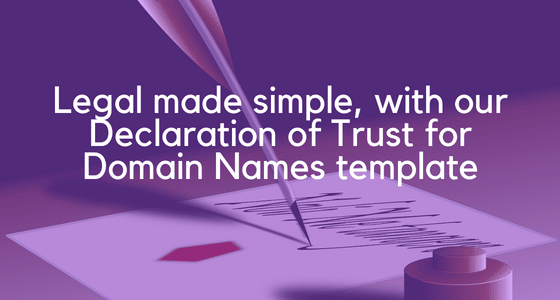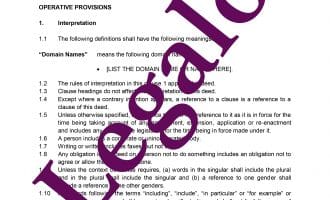Declaration of Trust for Domain Names
Our Declaration of Trust for Domain Names template:
- complete it in minutes
- drafted by an experienced UK solicitor
- satisfaction guaranteed
- simple to complete

How Does It Work?
-
1. Download
-
2. Edit
-
3. Print
-
4. Sign
Our Declaration of Trust for Domain Names template is for use where a nominee holds a single domain name or multiple domain names in trust for someone else. Either could be an individual or a company. The Declaration of Trust template is brief, without unnecessary waffle, thus making it quick and simple for you to use.
Using a Declaration of Trust for Domain Names
Put the declaration of trust in place straight-away when you realise that the domain name in the name of someone other than the real owner. Perhaps it is in the name of a shareholder or director, when it ought to be in the company’s name.
Whenever a domain name is in the name of a nominee, the nominees should make such a declaration of trust as soon as possible, so no disputes arise later as to the true ownership.
The nominee does not need to register the declaration anywhere, e.g. you do not send it to the domain name hosting company for registration. You might need to send a copy of it to the domain name hosting company at a later stage, if ever a dispute arose over the ownership. So you can see, at that point, having a declaration is good proof.
When you have the declaration of trust in place, there is then no real need for the beneficial owner to ask the nominee to transfer the domain name(s) to him immediately (although it gives him to the power to require this at any point). Such a transfer might do some level of harm to the search engine optimisation (SEO) of the domain name, so it can be better to leave it registered in the nominee’s name and simply get a declaration of trust in place.

Declaration of Trust for Domain Names: a Bare Trust
Our template sets up a bare trust, not a discretionary trust. A “bare trust” means a trust where the asset is held for a specific other person. A “discretionary trust” means one where:
- there is a pool or group of possible beneficiaries, and
- there will be a selection of the actual beneficiary/ies made in the future by the trustees from that group.
We have other trust documents should you need them:
- Declaration of trust for bank accounts;
- Declaration of trust for shares; and
- Bare trust deed (for general use).
Registration of your trust with HMRC
On 6 October 2020 it became law to register all new trusts with HMRC. You even need to register ones that are not taxable. To register it on time, you have 90 days from the date of it’s being created to do so. For further information and to register it click here.
Using our Declaration of Trust for Domain Names template
When you buy our template, is comes with a free guide to filling it in and using it. You will find it very easy to use as a result. If you have any problems or queries with it, you can simply:
- pick up the telephone or
- send an email to our free helpline service.

Clauses in this Declaration of Trust for Domain Names
Here is an excerpt from the guide to the template, which you receive when you purchase the template:
1. Interpretation
This clause defines the main terms used in the declaration.
- Domain Names – fill in the details of the domain name or names. If there is only one domain name in the nominee’s name, it is simplest if you leave the definition spelt in the plural form here and throughout the document.
2. Declaration of trust
This is the main clause, which states that the nominee holds the domain names in trust for the beneficial owner.
3. Undertaking
Clause 3.1 provides that the nominee will account to the beneficial owner for any benefits received in respect of the domain names, will keep up the registrations of them, advise the beneficial owner of the log-ins and passwords for them and will only deal with them in accordance with the way he is directed to by the beneficial owner. It also says that if the beneficial owner asks the nominee to transfer the domain names to him or to another nominee or to sell them, then the nominee will obey. Clause 3.2 states that the beneficial owner will reimburse the nominee for the proper costs incurred in keeping the registrations up-to-date.
4. Power of attorney
This gives a power of attorney in favour of the beneficial owner. This protects the beneficial owner in case the nominee does not follow his directions. With the log-ins and passwords for the registrations of the domain names, which are to be provided under clause 3.1.2, this will act as a form of security.



